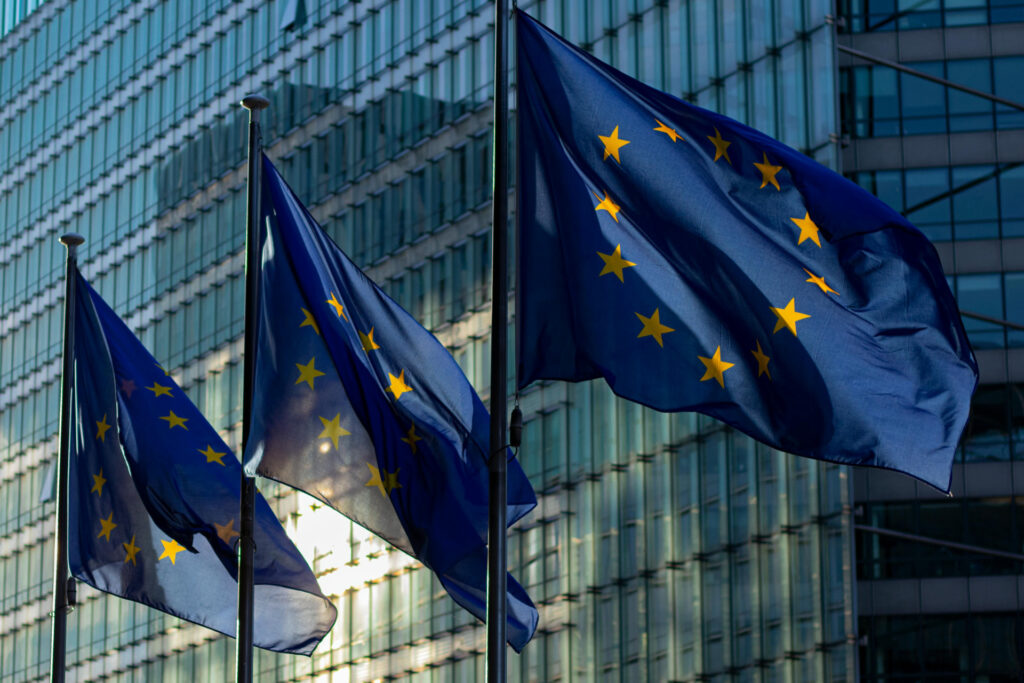The future of artificial intelligence might not be written in Silicon Valley boardrooms or Beijing research labs. Instead, it’s being legislated in Brussels, one clause at a time. This article explores how the EU’s AI Act is setting a global standard for AI regulation, prioritising ethics and human rights over unchecked innovation.
On August 1, 2024, the EU AI Act officially came into force. Its phased implementation marks a global first: a comprehensive attempt to shape the development of AI before it further shapes us. But this isn’t just a regulatory framework. It’s also a statement about values, direction, and intent. Moreover, it seems to mark an approach by Brussels working in service of citizens, not just for the internal economic market.
Think about it. When was the last time you worried about your mobile phone bill while travelling in Europe? GDPR gave you control over your data. Consumer protection laws gave meaningful warranties, and made returns and repairs fair. Environmental regulation helped clean up the air and water. Banking regulations safeguard savings.
These aren’t merely abstract policy achievements. Often now taken for granted, they’ve become part of daily life for EU citizens. The AI Act follows the same path: it reasserts that ethical governance should not trail behind innovation, but instead should guide it. Especially when ungoverned innovation risks deepening polarisation, destabilising democracies, or when it concerns technologies that act without accountability; now ethical and moral governance takes precedence over corporate freedoms.
In a time where populist movements exploit technology, where corporate algorithms amplify division for profit, and where AI-powered systems increasingly shape everything from job prospects to political opinions, the EU has made a clear choice: technology should serve human dignity, not undermine it.
And so, the question arises whether the world can afford to ignore that choice.
Handbrakes or Guardrails?
AI isn’t just another technological advancement. It fundamentally changes how decisions are made, how public narratives form, and how power moves through society. It illustrates why it’s imperative to view AI regulation not as handbrakes on innovation but as necessary guardrails to ensure technology serves society responsibly.
The companies developing these systems aren’t simply building products; they’re creating the information environments that shape public discourse, political understanding, and social cohesion.
And we’ve seen what happens when powerful systems or self-serving businesses operate with minimal oversight.
Sony’s DRM rootkit secretly installed invasive software on computers and compromised millions of devices in the name of copyright protection. Cambridge Analytica weaponised Facebook’s data collection to manipulate democratic processes across multiple countries. Uber bypassed labor laws, Amazon manipulated its marketplace, Volkswagen rigged emissions systems, and Equifax’s negligence exposed personal data of nearly half the U.S. population.
These aren’t simply isolated incidents; they’re far-reaching combinations of criminality, fraud, and abuse, with a huge impact on consumers, markets, and society. And they’re precisely why the EU AI Act becomes more than regulation. It becomes a statement about what kind of future we want to live in.

Consider the Act’s ban on “social scoring” systems. This isn’t just about privacy; it’s about preventing the emergence of digital authoritarianism. The legislation explicitly prohibits AI systems that could be used to manipulate human behavior in ways that undermine free will or democratic participation. It’s a direct response to the recognition that technology, left ungoverned, tends toward control rather than liberation.
The Act’s transparency requirements for high-risk AI systems similarly address a fundamental power imbalance. When algorithms make decisions about hiring, lending, or criminal justice, the people affected by those decisions have a right to understand how they work. This isn’t anti-innovation; it’s pro-democracy.
But perhaps most importantly, the Act’s approach to general-purpose AI (GPAI) models acknowledges that some technologies are simply too consequential to be left entirely to market forces. The requirement for copyright compliance, content summaries, and risk assessments for GPAI, set to apply from August 2025, isn’t bureaucratic overreach; it’s an acknowledgement that these systems will reshape entire industries and deserve proportional oversight.
Populism, Technology, and the Question of Trust
Here’s where the EU AI Act reveals its deeper strategic thinking. In country after country, populist movements have weaponised technological anxiety, turning legitimate concerns about automation, surveillance, and manipulation into political capital. For instance, during the Brexit campaign, targeted ads and misinformation spread through social media platforms played a significant role in shaping public opinion. The “Brussels bureaucrats are stifling innovation” narrative practically writes itself.
But here’s what that narrative misses: Brussels has a track record of getting this right. GDPR didn’t kill European tech innovation; it created a global standard for privacy protection that benefits everyone. EU consumer protection laws didn’t destroy commerce; they created market conditions where consumers could trust their purchases. Environmental regulations didn’t cripple European industry; they drove innovation in clean technology.
The Act’s framers seem to have understood something crucial. When Cambridge Analytica harvested Facebook data to manipulate elections, that wasn’t innovation; it was weaponisation. When Uber used technology to circumvent local employment laws, that wasn’t disruption; it was exploitation.
When AI systems are designed to maximise engagement rather than understanding, they inevitably amplify the most divisive content. When algorithmic hiring systems perpetuate historical biases, they entrench inequality. When deepfakes and manipulated content flood information systems without clear labelling, they undermine the shared reality that democratic discourse requires.
The Act’s approach to these challenges is both pragmatic and principled. Rather than banning controversial technologies outright, it requires transparency and accountability. Rather than impeding innovation, it channels it toward socially beneficial applications. Rather than leaving these questions to market forces, it asserts that democratic societies have the right to shape their own technological future.
This matters because AI has the potential to be either democracy’s greatest tool or its most dangerous enemy. Used thoughtfully, AI can enhance human understanding, break down barriers to inclusion, and help us solve collective problems that seemed intractable. Used carelessly, it becomes a weapon for those who profit from division and confusion.

Corporate Responsibility in the Age of Algorithmic Power
Much of the current AI boom is built on one-sided economics. Companies capture the economic benefits of AI systems while society bears the risks. Think job displacement, algorithmic bias, misinformation, privacy violations, and the erosion of creative industries.
Sound familiar? It’s the same pattern we’ve seen before. Facebook monetised personal data and social connections while externalising the costs of political manipulation and mental health impacts. Uber captured the benefits of platform economics while pushing the costs of driver welfare and regulatory compliance onto cities and workers. Amazon built a marketplace empire while externalising the costs of anti-competitive practices and warehouse worker conditions.
The EU AI Act directly challenges this arrangement. By requiring companies to conduct risk assessments, ensure data quality, and take responsibility for the downstream effects of their systems, it’s essentially demanding that AI developers pay the full cost of their innovations.
This shift is particularly important given the industry’s track record. The “move fast and break things” mentality that defined earlier tech platforms has already broken quite a lot: democratic discourse, media ecosystems, mental health among young people, and the economic prospects of countless creative professionals.
Counterpoint: even well-intentioned regulations can miss the mark. GDPR’s cookie consent requirements, designed to give users control over their data, instead created the irritating reality of clicking through endless cookie pop-ups that most people ignore anyway. The regulation succeeded in raising awareness about data privacy but failed to deliver meaningful user empowerment. It stands as a reminder that good intentions don’t automatically translate to good outcomes.
The Sony rootkit scandal? In their zeal to protect copyrighted music, Sony installed invasive software that made millions of computers vulnerable to malicious attacks. The Equifax breach exposed 147 million people’s personal information due to negligent security practices. Volkswagen’s emissions cheating showed how companies will systematically deceive regulators when they think they can get away with it.
The idea that we should trust the same approach with even more powerful AI systems isn’t just naive; it’s dangerous. Even when AI systems appear well-intentioned (like X’s Grok, which seems more truth-oriented than previous AI chatbots), they exist within platform ecosystems that have their own incentives and potential for abuse. A truthful AI is only as trustworthy as the platform that controls it.
The Act’s requirements for copyright compliance in AI training data illustrate this point perfectly. For years, AI companies have essentially argued that copyrighted content is fair game for training their models because the potential benefits outweigh the costs. By requiring AI companies to respect copyright law and provide transparency about their training data, the Act is asserting a simple principle: innovation doesn’t give you the right to help yourself to other people’s work. If your business model depends on using copyrighted content without compensation, then you need a different business model.
This isn’t anti-progress; it’s pro-fairness. And it reflects a deeper understanding that sustainable innovation requires broad social buy-in, not just technical feasibility.
Values as Competitive Advantage
The EU AI Act isn’t just ‘domestic’ policy; it’s global strategy. Just as GDPR created a “Brussels Effect” that influenced privacy regulations worldwide, the AI Act is designed to export European values through market mechanisms. By embedding these values into regulatory frameworks, the EU not only safeguards its citizens but also sets a global precedent for ethical technology use.
Of course, Brussels hasn’t always nailed the execution. REACH and ECHA regulations, while admirably comprehensive in protecting Europeans from chemical hazards, created a bureaucratic labyrinth that even well-intentioned companies struggle to navigate. The EU’s environmental laws are often exemplary in ambition but patchy in enforcement. Great on paper, less consistent in practice. These experiences offer important lessons for AI Act implementation: good intentions need good execution, and comprehensive frameworks require equally comprehensive support systems.
Any company wanting to operate in the EU market (which includes most major AI developers) will need to comply with European standards. This means that European concepts of privacy, transparency, and democratic accountability will be baked into AI systems used around the world.

This creates an interesting dynamic. While the US continues to favor market-driven approaches and China pursues state-directed AI development, the EU is offering a third path: democratic governance of transformative technology. For countries struggling with how to balance innovation with social stability, the European model seems to provide a tested framework.
The Act’s emphasis on fundamental rights — privacy, non-discrimination, human dignity — also sets a moral benchmark that human rights advocates globally can point to. In an era where authoritarian governments are increasingly using AI for surveillance and control, the EU’s approach provides both a normative framework and practical tools for resistance.
Inclusion, Growth, and Understanding
Here’s what gets lost in debates about regulation impeding innovation: the EU AI Act isn’t anti-technology. It’s pro-human technology. It’s based on the understanding that AI’s greatest potential isn’t in replacing human judgment but in enhancing human capability.
Consider the Act’s requirements for workplace AI systems. Rather than allowing algorithms to make hiring and firing decisions in black boxes, it requires transparency, human oversight, and worker information rights. This isn’t about protecting jobs from automation; it’s about ensuring that when AI is used in employment contexts, it serves human flourishing rather than dehumanising efficiency.
The Act’s approach to AI in education similarly recognises that the technology’s value lies in personalising learning, identifying individual strengths, and creating more inclusive educational environments. But it also recognises that these benefits require careful implementation, with safeguards against bias and respect for human agency.
For example, AI-driven language translation tools have broken down communication barriers, enabling more inclusive global interactions.
Most importantly, the Act’s framework creates space for AI applications that prioritise social benefit over profit maximisation. By establishing clear guidelines for high-risk applications while leaving room for responsible innovation in low-risk areas, it encourages the development of AI systems that genuinely serve human needs.
This matters because AI’s potential for good is genuinely extraordinary. Machine learning can help us understand complex systems, identify patterns invisible to human analysis, and solve coordination problems that have plagued societies for centuries. AI can break down language barriers, make specialised knowledge accessible to everyone, and help us make better decisions by processing information beyond human scale.
But realising this potential requires intention. It requires choosing to develop AI systems that enhance human agency rather than undermining it, that increase understanding rather than confusion, that bring people together rather than driving them apart.
The Real Innovation Challenge
The most common criticism of the EU AI Act is that it will impede innovation by imposing bureaucratic burdens on AI developers. But the Act isn’t trying to slow down AI development; it’s trying to redirect it toward socially beneficial applications.
True innovation isn’t about building the most powerful system possible, regardless of consequences. Consider how GDPR compliance has spurred innovation in data encryption technologies, enhancing privacy without stifling technological advancement. It’s about solving real problems in ways that make life better for real people. The Act’s requirements for transparency, accountability, and human oversight don’t prevent this kind of innovation; instead, they encourage it.
Consider what compliance with the Act actually requires: understanding how your AI systems work, being able to explain their decisions, ensuring they don’t perpetuate harmful biases, and taking responsibility for their impacts. These aren’t bureaucratic obstacles; they’re engineering challenges that will ultimately lead to better, more robust AI systems.
The companies that view the Act as a burden are revealing something important about their approach to development. If your AI system can’t meet basic standards for transparency and accountability, the problem isn’t the regulations; the problem is the AI system.
Meanwhile, the companies that embrace the Act’s framework will likely discover that building ethical AI isn’t just morally right; it’s strategically smart. Systems that are transparent, accountable, and aligned with human values are more likely to earn public trust, regulatory approval, and sustainable market adoption.

The Global Inflection Point
The EU AI Act represents more than European policy. It’s a global inflection point.
For the first time, a major economic power has asserted that transformative technology must be governed by democratic values rather than purely market forces. This matters because the current moment won’t last. AI capabilities are advancing rapidly, and the window for thoughtful governance is closing. The choices we make in the next few years about how to govern AI will shape the technology’s development for decades to come.
The EU has made its choice: technology should serve human flourishing, democratic values, and social cohesion. It should be transparent, accountable, and aligned with fundamental rights. It should enhance human capability rather than replace human judgment.
Other major powers now face their own choice. They can dismiss the EU approach as regulatory overreach and continue with market-driven development. They can follow China’s model of state-directed AI development. Or they can develop their own frameworks for democratic governance of transformative technology.
But they can’t ignore the EU’s approach. The Brussels Effect is already in motion. Companies are adapting their AI systems to meet European standards. Other countries are studying the Act as a model for their own regulations. The conversation about AI governance has shifted from whether regulation is needed to what form it should take.
Beyond Compliance: The Moral Imperative
Ultimately, the EU AI Act is about more than technical compliance or market access. It’s about the kind of society we want to live in and the role we want technology to play in creating it. Critics may argue that stringent regulations stifle innovation, but the EU’s approach demonstrates that ethical guidelines can spur responsible innovation that benefits society as a whole.
In an era of rising inequality, democratic backsliding, and social fragmentation, the Act represents a different vision: technology as a tool for inclusion rather than exclusion, for understanding rather than manipulation, for human flourishing rather than pure efficiency.
The current trajectory of AI development — driven primarily by profit maximisation and military applications — isn’t sustainable. It’s creating systems that amplify existing inequalities, concentrate power in the hands of a few large corporations, and undermine the social cohesion that democratic societies require. The EU AI Act offers a different path: one where technological progress serves human values, where innovation includes consideration of social impact, and where the benefits of AI are shared broadly rather than captured narrowly.
The question isn’t whether this approach will slow down AI development. It’s whether we can afford to continue developing AI without it. The stakes are too high, the potential consequences too significant, and the opportunity too important to leave to market forces alone.
The future of AI isn’t predetermined. It’s a choice. And with the AI Act, the European Union has made clear what it’s choosing: a future where technology serves humanity, rather than the other way around.
The world is watching, and the path we choose now will shape more than technology. The question is whether the Brussels Effect will prove timely and strong enough to take hold.
https://www.linkedin.com/pulse/brussels-effect-eus-ai-act-global-compass-roland-biemans-xwvze

Comments are closed